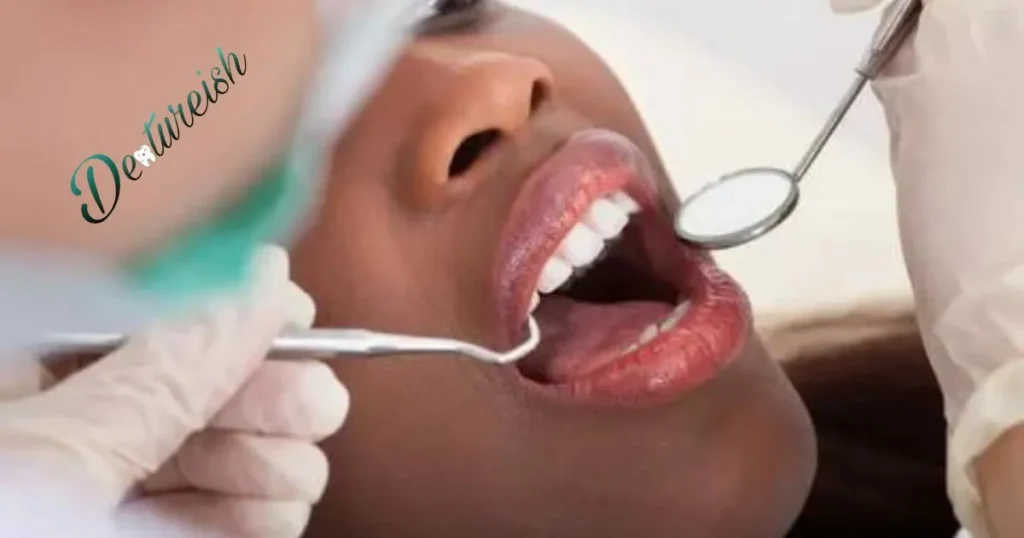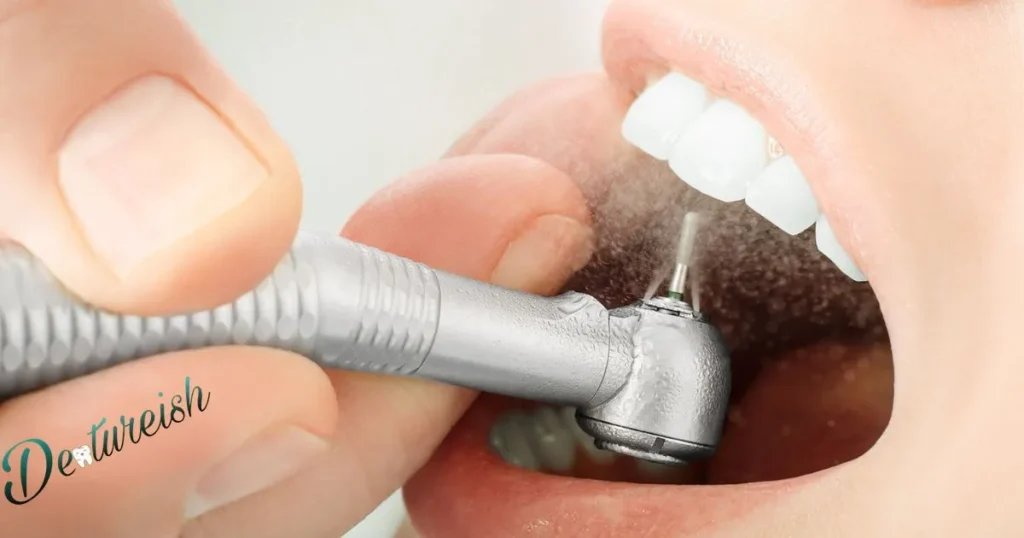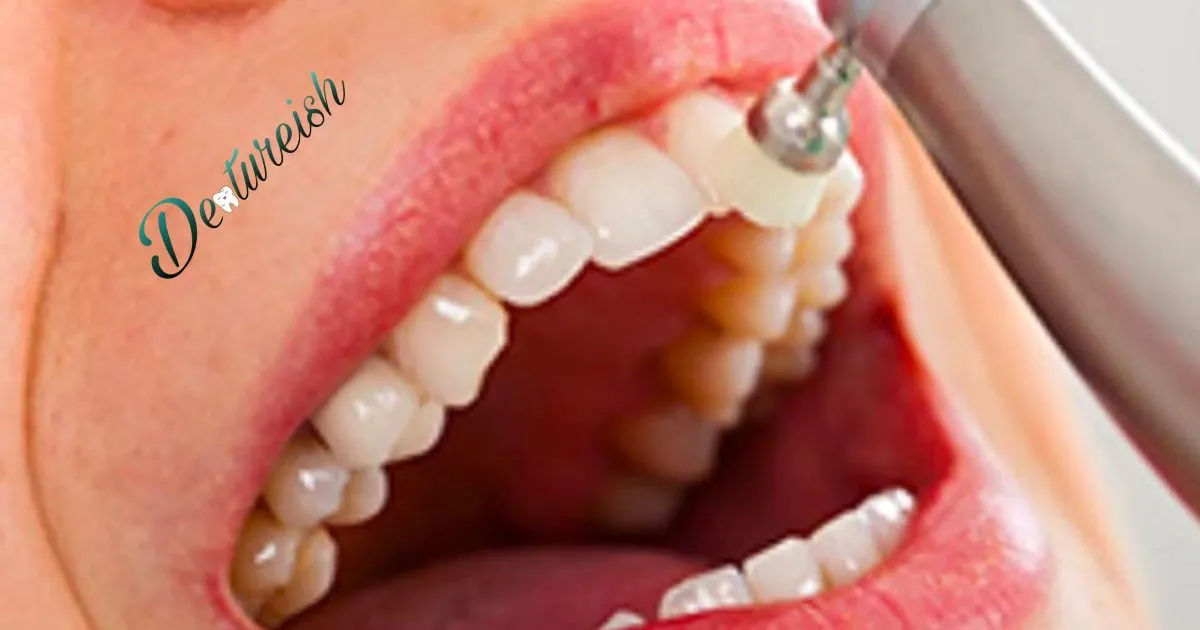Cleaning tartar off dentures refers to the process of removing hardened dental plaque, also known as tartar or calculus, from dentures. Dentures, like natural teeth, can accumulate plaque which, if not removed promptly, can harden into tartar. This tartar can cause discoloration and may lead to bad breath or even gum disease. Therefore, it’s crucial to maintain the cleanliness of dentures to ensure oral health.
Have you ever wondered, How To Clean Tartar Off Dentures? It’s a question that many denture wearers often ask. The answer is not as complicated as you might think. With the right tools and techniques, you can keep your dentures tartar-free and in top condition. This not only improves the appearance of your dentures but also contributes to your overall oral health.
Cleaning tartar off dentures involves a few simple steps that can be easily incorporated into your daily routine. This includes regular brushing, soaking the dentures in a cleaning solution, and occasionally using a tartar-removing product. It’s also important to have regular check-ups with your dentist to ensure that your dentures are in good condition and to get professional cleaning when necessary. With proper care and maintenance, you can keep your dentures looking and feeling fresh.
Understanding Denture Tartar Buildup
Tartar, also known as dental calculus, is a hardened form of dental plaque that can accumulate on both natural teeth and dentures. It forms when plaque, a sticky film of bacteria, interacts with minerals in saliva, leading to a mineralized buildup.
This process is not exclusive to natural teeth; dentures, too, can harbor tartar, especially if they are not cleaned regularly. Tartar buildup on dentures can lead to various oral health issues, including gum inflammation and bad breath, underscoring the importance of maintaining a consistent denture cleaning routine1.
What Is Tartar And How Does It Affect Dentures?
Tartar is essentially hardened dental plaque. When plaque on dentures is not removed promptly, it can calcify into tartar, presenting as a hard, rough layer that is often tan or beige in color.
This buildup not only affects the aesthetic appearance of dentures but can also contribute to gum disease and other oral health problems if not addressed. Unlike plaque, Step By Step At Home which can be removed through regular cleaning, tartar requires professional intervention to be safely and effectively eliminated.
The Composition Of Tartar On Dentures
The composition of tartar on dentures mirrors that on natural teeth, consisting of a calcified matrix of dental plaque. This matrix forms when the bacteria in plaque interact with minerals in the saliva, leading to a hard, cement-like substance.
This substance adheres strongly to the surfaces of dentures, embedding itself in any crevices or irregularities and can become stained over time, leading to discoloration. The presence of tartar can make dentures more difficult to clean and can compromise the fit and comfort of the appliance.
Identifying Tartar Accumulation On Dentures
Tartar accumulation on dentures can be identified by its hard, rough texture and its tan or beige color. It often forms in areas that are difficult to clean thoroughly, such as along the gum line or between teeth in the denture.
Over time, tartar can lead to staining and discoloration of the dentures, making them appear less aesthetically pleasing. Regular inspections of dentures for signs of tartar buildup are crucial, as early detection can prevent more serious oral health issues from developing.
The Impact Of Tartar On Denture Hygiene
The presence of tartar on dentures significantly impacts denture hygiene. Tartar provides a rough surface that can harbor additional bacteria, leading to an increased risk of gum disease and bad breath.
The abrasive nature of tartar can damage the soft tissues of the mouth if the dentures are not cleaned properly. Maintaining optimal denture hygiene involves not only regular cleaning to prevent tartar formation but also professional check-ups to remove any tartar that has accumulated. This ensures that the dentures remain in good condition and that oral health is preserved.
Preparing To Clean Your Dentures

Before cleaning your dentures, it’s crucial to ensure that you have a clean, soft workspace to prevent them from being damaged if dropped. This often means laying out a towel or filling a sink with water. It’s also important to wash your hands thoroughly to avoid transferring bacteria to your dentures.
Gathering The Right Tools For Denture Cleaning
The right tools for denture cleaning include a soft-bristled toothbrush or a denture brush specifically designed for the task, mild dishwashing liquid or a denture cleaner approved by the American Dental Association (ADA), and a denture soaking solution for overnight soaking. Avoid using abrasive cleaning materials, whitening toothpastes, or products containing bleach, as these can damage dentures.
When Should You Clean Your Dentures?
Dentures should be cleaned daily to remove food particles and plaque, and to prevent staining. It’s best to clean them over a sink filled with water or a folded towel to minimize the risk of breakage if they are dropped. Additionally, soaking them overnight in a denture-cleaning solution helps to keep them moist and maintain their shape.
Pre-Cleaning Denture Inspection
Before cleaning, it’s important to inspect your dentures for any signs of wear or damage, such as cracks or chips. This inspection can help prevent further damage during the cleaning process. If any damage is noticed, consult with a dental professional before attempting to clean or repair the dentures yourself.
The Importance Of Regular Denture Maintenance
Regular denture maintenance is essential not only for the longevity of the dentures but also for oral health. Proper care prevents the buildup of bacteria and fungi, which can cause infections such as stomatitis and cheilitis. Additionally, maintaining your dentures can help ensure a comfortable fit and prevent irritation and sores from developing in your mouth.
Step-By-Step Guide To Removing Tartar From Dentures
To remove tartar from dentures, start by filling a bowl with warm water and submerging the dentures to loosen debris. Then, use a soft-bristled toothbrush and gently scrub the dentures, paying close attention to crevices and hard to reach areas where tartar accumulates. Avoid using abrasive cleaners which can scratch the denture material.
Soaking Dentures To Loosen Tartar
Soaking dentures in warm water for 5-10 minutes before brushing is an effective way to loosen tartar and make it easier to remove. Denture soaking solutions containing effervescent tablets can also help lift stains and soften tartar buildup through gentle bubbling action. Be sure to rinse dentures thoroughly after soaking.
Brushing Techniques For Tartar Removal
When brushing dentures to remove tartar, use gentle circular scrubbing motions and pay close attention to porcelain teeth, clasps, and crevices where tartar accumulates. Make sure to regularly replace worn toothbrush heads. Alternatively, ultrasonic cleaners can be used to loosen tartar for easier brushing.
Specialized Denture Cleaners And Solutions
Specialized denture cleaning pastes, liquids and tablets can help break down tartar, remove stains, and disinfect dentures. Look for ADA-approved products containing sodium hypochlorite or other antimicrobial ingredients. Use as directed and avoid abrasive cleansers which can damage dentures over time with repeated use.
Preventing Tartar Buildup on Dentures
To prevent tartar buildup on dentures, it is essential to maintain good oral hygiene by brushing the dentures daily with a soft denture brush and mild denture cleaner. Soaking dentures overnight in a mild denture-soaking solution or cool water can also help prevent drying or cracking, which can contribute to tartar accumulation. Regular inspection of dentures for any signs of tartar and addressing them promptly is crucial.
Daily Denture Care Habits To Prevent Tartar
Daily denture care habits include removing and gently flossing between and brushing gums, tongue, and the roof of the mouth to eliminate bacteria that contribute to tartar formation.
Dentures should be cleaned daily using a soft denture brush and mild cleaner, and they should be soaked overnight in a proper cleaning solution to keep them moist and clean. This routine helps prevent plaque buildup, which can calcify into tartar.
Are Water Flossers Effective For Denture Tartar Prevention?
The search results do not directly address the effectiveness of water flossers for denture tartar prevention. However, water flossers can be a useful tool for maintaining oral hygiene, which is a critical factor in preventing tartar buildup on natural teeth.
It can be inferred that they may also help in cleaning dentures effectively, although specific recommendations for their use with dentures are not provided in the search results.
The Role Of Diet In Tartar Accumulation On Dentures
Diet plays a significant role in tartar accumulation on dentures, as sugary sweets and foods can lead to increased plaque formation, which can eventually harden into tartar. It is important to maintain a balanced diet and limit the intake of sugary foods to minimize the risk of tartar buildup. Additionally, staying hydrated helps maintain saliva production, which is beneficial in preventing tartar accumulation.
Regular Professional Denture Cleanings
Regular professional denture cleanings are essential for maintaining denture hygiene and preventing tartar buildup. Dentists have the expertise to detect early signs of tartar and can remove it safely using special instruments. Routine dental checkups allow for the monitoring of dentures’ condition and the receipt of professional cleanings, which are the best way to keep the mouth and teeth healthy.
Troubleshooting Common Denture Cleaning Challenges

Proper denture maintenance is crucial for oral health and denture longevity. Common challenges include removing food particles, avoiding staining, and preventing bad odors. Regular cleaning with a soft-bristle brush and non-abrasive cleaner is essential.
Soaking dentures in a cleaning solution can help loosen debris. It’s important to avoid hot water, which can warp dentures, and abrasive materials that can scratch, making them more susceptible to staining and odor retention.
Dealing With Stubborn Tartar On Dentures
Stubborn tartar buildup on dentures can be frustrating. Unlike regular cleaning, tartar removal often requires soaking in a specialized solution designed to break down calcium and phosphate deposits.
Vinegar or baking soda solutions can be effective home remedies, but they should be used cautiously to avoid damaging the dentures. Regular professional cleanings can also help manage tartar buildup, ensuring the dentures remain in good condition.
Can Over-Cleaning Damage Dentures?
Over-cleaning dentures can indeed cause damage. Using abrasive materials, harsh chemicals, or excessive brushing can wear down the denture material, leading to scratches where bacteria and stains can accumulate.
Similarly, soaking dentures in bleach or hot water can weaken them and cause warping. It’s important to follow manufacturer guidelines and use products specifically designed for dentures to avoid unintentional damage.
When To Seek Professional Help For Denture Tartar
Professional help should be sought for denture tartar when home cleaning methods fail to remove buildup effectively. Persistent tartar can harbor bacteria, leading to oral health issues and bad breath.
Dentists and dental technicians have specialized tools and solutions that can safely and thoroughly clean tartar from dentures restoring their appearance and hygiene without risking damage to the denture material.
Ensuring Longevity And Comfort Of Your Dentures
Ensuring the longevity and comfort of your dentures involves regular maintenance, proper cleaning, and timely adjustments. Daily cleaning to remove food particles and plaque, along with periodic professional cleanings, can prevent problems.
It’s also important to store dentures properly when not in use and to handle them carefully to avoid breakage. Regular dental check-ups are crucial for adjustments to ensure a comfortable fit as the mouth’s shape changes over time, maintaining optimal comfort and functionality.
Frequently Asked Question
How Can I Remove Tartar From My Dentures At Home?
You can remove tartar from your dentures at home by soaking them in a solution of equal parts white vinegar and warm water for about 15-20 minutes. After soaking, use a soft denture brush to gently scrub the denture surface, paying extra attention to areas with visible tartar buildup.
What Supplies Do I Need To Clean Tartar Off My Dentures?
To clean tartar off your dentures, you’ll need a denture brush, a non-abrasive denture cleaner, warm water, and white vinegar. The denture brush is used to scrub the dentures, the cleaner helps break down tartar, and the vinegar is known for its tartar-dissolving properties.
Can I Use Baking Soda To Clean My Dentures?
Yes, baking soda can be used to clean dentures. You can create a paste by mixing baking soda and water, apply it to your dentures, and gently brush. This technique is an easy and cost-effective way to tackle plaque buildup.
How Often Should I Get My Dentures Professionally Cleaned?
It’s recommended to have your dentures professionally cleaned at least once a year, or more often if advised by your dental professional. Regular dentist visits complement your at-home care, providing a deeper clean and the chance to catch potential problems before they escalate.
Can I Use Regular Toothpaste To Clean My Dentures?
No, regular toothpaste is often too abrasive for false teeth and can cause microscopic scratches where bacteria and tartar can build up. Always opt for a specialized denture cleaner.
Conclusion
How To Clean Tartar Off Dentures? To maintain the health and appearance of your dentures, it’s essential to clean them regularly to prevent tartar buildup. A mixture of white vinegar and warm water can be used to soak the dentures, softening and dissolving the tartar. After soaking, a gentle brushing with a denture-specific brush and non-abrasive cleaner should remove any remaining deposits. It’s important to avoid using harsh chemicals or scrubbing too vigorously to prevent damage to the dentures.
For stubborn tartar that doesn’t come off with home cleaning, seeking professional help is advisable. Dentists and dental technicians have the expertise and tools to clean dentures thoroughly without causing harm. To ensure your dentures last and remain comfortable, incorporate a daily cleaning routine, handle them with care, and have regular dental check-ups for adjustments.

